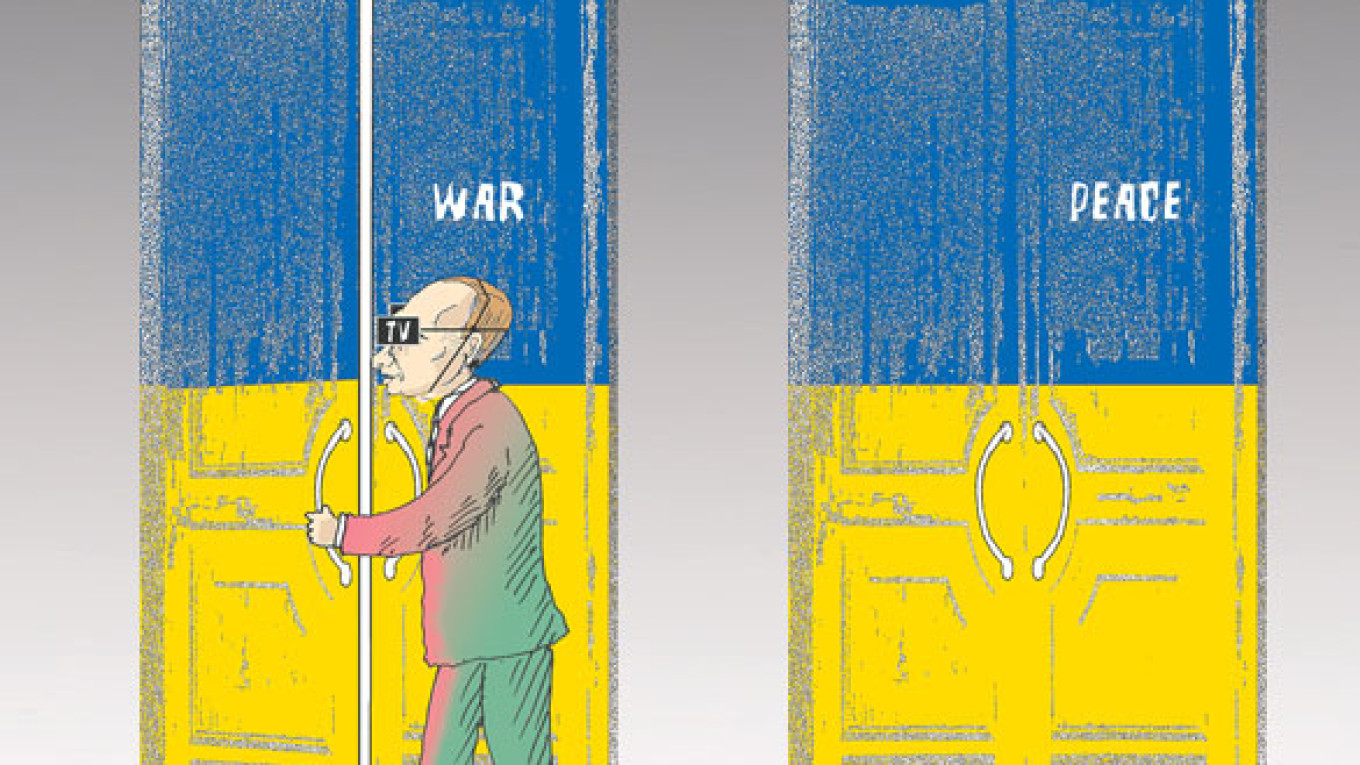The events in Ukraine are unfolding faster than the media can report them. As I predicted back in November, impeached Ukrainian President Viktor Yanukovych has failed to serve out his term. Even if he retains a semblance of authority from his power base in eastern Ukraine, it is only the death throes of a presidency that one year ago nobody could have imagined would end so ignominiously. After all, Yanukovych came into office through elections that both Russia and the West recognized as relatively honest.
The reins of power are lying loose in Ukraine today. This situation is certainly not like the Moscow of October 1993, but it does call to mind the St. Petersburg of October 1917. At such historical junctures, the advantage goes not to those who win a majority of votes in relatively peaceful times, but to those who pursue the most resolute and determined course of action amid the mounting chaos. Any revolution is simply a coup carried out by the most prominent activists opposing the ruling regime.
Of course, it is political marauders who tend to make the most skilful use of the fruits of revolutions. The "Bolsheviks" in today's Ukraine are the Right Sector radicals led by Dmitro Yarosh and other similar organizations who zealously advocate nationalist ideas. These groups are highly organized — a critical factor in such moments in history — and their leaders functioned like field commanders during Euromaidan, ordering hundreds of followers to occupy or stand guard over government buildings. Their minions execute those commands far better than Ukraine's Berkut riot police carried out orders from Yanukovych — who, by the way, ultimately betrayed his orders by fleeing.
In such critical moments, the ability of the people to organize at a grassroots level is the most important of all. In my opinion, Russia's state television spin doctors have gotten too carried away with branding the protesters as Nazis, thugs and radicals. There are plenty of radicals, yes, but such people always appear along with everyone else during a major upheaval. In fact, the majority of demonstrators were ordinary citizens who did not take to the streets in return for money. Revolutions and coups are never carried out for money, although most Russian propagandists seem to believe that the demonstrators were all collecting Western money to live in tent cities and risk their lives before snipers' guns.
Indeed, attempts to pay off people did play a role in Euromaidan, but not on the part of protesters. Yanukovych, with his gangster-like approach, used the Berkut riot police as a legal band of thugs to extort money from and intimidate large and small business owners and ordinary citizens alike. Anger over those actions helped fuel the Euromaidan protest. Yanukovych lost power not only because he attempted to blackmail both the European Union and Russia, but because he and his inner circle had simply stolen too much from the people.
Ukraine is entering a period of chaos. Grassroots efforts alone cannot preserve the state, although they might manage to maintain a basic level of order by keeping, say, water and sewage operations functioning in the cities. But at some point a government must be formed — whether a single national authority or regional entities.
I do not believe the notion that Ukraine is necessarily headed toward division. The Euromaidan leaders and the majority of Ukrainians do not want the country to split, and although the eastern and western regions might have their disagreements, they still see each other as members of a single nation. However, the Verkhovna Rada, which has assumed all of what little authority exists in the country today, is clearly incapable of re-establishing Ukraine's statehood. It is just possible that former Ukrainian Prime Minister Yulia Tymoshenko will emerge as that ace in the hole who is capable of carrying the country through its current crisis.
A word needs to be said here about the EU's policy toward Ukraine. European officials clearly went too far in their tug-of-war with Moscow.
For its part, Moscow fell victim to its own anti-Western paranoia and ideas about a zero-sum game. Multilateral negotiations that include the EU and Russia need to be convened to help determine Ukraine's future. It is high time that all these players, along with the U.S., make good on their claims to have put the Cold War behind them. They must work together to help this country of 50 million people that is teetering on the edge of collapse in the heart of Europe find a peaceful and productive solution to its problems. The only alternative is war — and that war might easily go from "cold" to "hot" very quickly.
European leaders have yet to realize that Russia's rulers view a geopolitical defeat in Ukraine as nothing less than an existential threat to Russia itself, a threat to which they must respond with every means in their power, including military might.
Georgy Bovt is a political analyst.
A Message from The Moscow Times:
Dear readers,
We are facing unprecedented challenges. Russia's Prosecutor General's Office has designated The Moscow Times as an "undesirable" organization, criminalizing our work and putting our staff at risk of prosecution. This follows our earlier unjust labeling as a "foreign agent."
These actions are direct attempts to silence independent journalism in Russia. The authorities claim our work "discredits the decisions of the Russian leadership." We see things differently: we strive to provide accurate, unbiased reporting on Russia.
We, the journalists of The Moscow Times, refuse to be silenced. But to continue our work, we need your help.
Your support, no matter how small, makes a world of difference. If you can, please support us monthly starting from just $2. It's quick to set up, and every contribution makes a significant impact.
By supporting The Moscow Times, you're defending open, independent journalism in the face of repression. Thank you for standing with us.
Remind me later.


